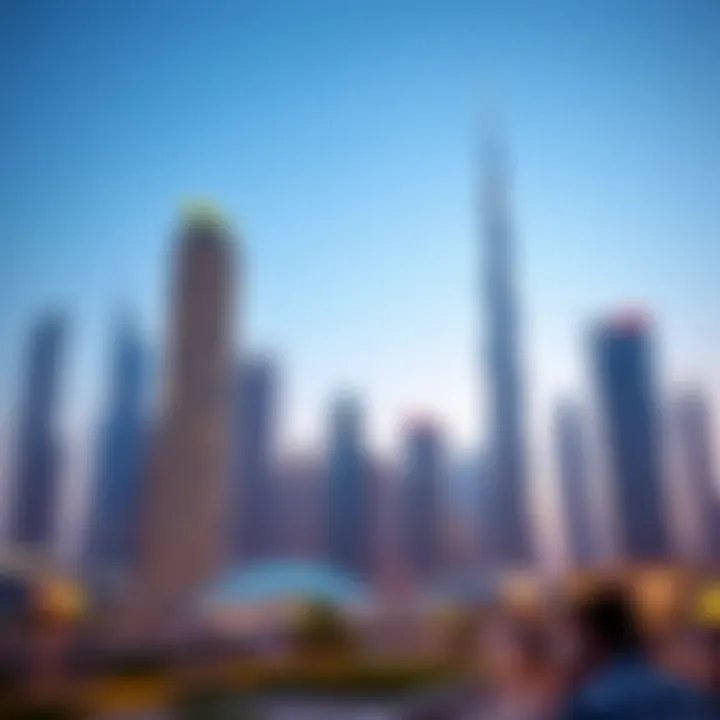Exploring the Expatriate Experience in Dubai


Intro
Dubai, a shimmering jewel nestled in the Arabian Peninsula, has become a hub for expatriates seeking new beginnings, professional growth, or simply an escape from the ordinary. As a city that embraces cultural diversity and economic prosperity, it's no surprise that millions call Dubai home, even if momentarily. The ever-evolving expatriate landscape is not merely a dimension of the city's allure; it plays a pivotal role in shaping its economy, particularly in the real estate sector.
In what follows, we will### gain insights into this multifaceted expatriate community. We will dive into the demographics, motivations behind moving to Dubai, and how their presence molds the city’s real estate market. With the right frameworks and understanding, potential investors and homebuyers can unlock the mysteries of this alluring urban tapestry.
Understanding the dynamics at play here will not just make sense of numbers and trends but will paint a vivid picture of Dubai as a vibrant melting pot; full of expats from all walks of life who contribute to its unique charm. Let's explore the threads that weave this intricate tapestry together.
The Expatriate Demographics of Dubai
When we talk about Dubai, one cannot overlook the vibrant tapestry woven by its expatriate community. The demographics of expatriates in Dubai are not just numbers on a page; they provide crucial insights into the social, economic, and cultural fabric of the city. Understanding who these expatriates are and what they bring to the table is vital for anyone looking to invest, work, or live in this bustling metropolis.
Expatriate demographics also play an essential role in shaping policies, businesses, and daily life in Dubai. Each nationality and community contributes unique skills, perspectives, and cultures, enriching the overall experience of living in the city. Acknowledging these demographics helps in recognizing the market demands and catering to the diverse needs of residents, be it in real estate, education, healthcare, or leisure services.
Current Statistics on Expat Population
As of recent data, approximately 90% of Dubai's population consists of expatriates, representing a staggering blend of nationalities. The UAE government estimates that around 3.4 million people call Dubai home, with expatriates hailing predominantly from India, Pakistan, Bangladesh, and the Philippines, among others.
These figures reveal a multifaceted mosaic of cultures, where different backgrounds intersect. In fact, expatriates from India make up about 27% of the total population, while those from Pakistan represent around 13%. This significant presence highlights the need for cultural sensitivity and inclusivity in policy-making and community engagement.
Moreover, according to the latest reports, the expatriate numbers have generally remained steady, showing resilience despite global fluctuations—be it in economies or even pandemics. This stability in numbers adds to the confidence investors and businesses have in the marketplace.
Expat Communities by Nationality
Dubai is a melting pot of cultures, and the various expat communities play an instrumental role in this diversity. Each group tends to form neighborhoods and social networks based on their origins. For instance:
- Indian Community: Predominantly located in Al Quoz and Bur Dubai, they have established bustling markets, temples, and restaurants that reflect their rich heritage.
- Pakistani Community: Concentrated mainly in Sharjah and Ajman but contributing to Dubai's landscape, this community has a vibrant presence in the construction and services sector.
- Western Expatriates: Although a smaller percentage, the communities from the UK, USA, and European nations often gather in areas like Dubai Marina and Jumeirah, contributing to the luxury lifestyle offerings.
Having a sense of belonging is crucial for expatriates. The social fabric created by these communities fosters connections that help newcomers adjust to life in Dubai. This relational aspect often leads to better community engagement, pronounced cultural exchange, and enhanced understanding among various groups.
Growth Trends Over the Years
Examining the growth trends of the expatriate population reveals intriguing patterns. Over the past decade, Dubai's expatriate community has seen considerable expansion in both numbers and diversity. In earlier years, the boom was predominantly driven by job seekers in construction and oil sectors. Today, it spans across various industries including technology, health care, and finance. This shift signifies not just the broadening of job sectors but also the appeal of Dubai as a global business hub.
A few notable trends have emerged:
- Emergence of Skilled Professionals: The influx of skilled labor has increased, with many multinational companies setting up offices in the UAE, attracting professionals from all corners of the globe.
- Family Units Moving In: More expatriates are now moving with families, resulting in a demand for family-oriented amenities, schools, and services, thereby influencing urban development within the city.
- Lengthening Stays: Unlike previous eras where expatriates often had shorter stays, increasingly, individuals are making longer-term commitments to Dubai, indicating a deeper integration into society.
Understanding these growth trends not only highlights the dynamism of Dubai's expatriate landscape but also provides critical insights for investors, developers, and policymakers alike.
Reasons for Relocation to Dubai
Understanding why expatriates choose Dubai as their new home is half the battle when trying to grasp the city’s dynamic landscape. The motivations are varied, often interlinked and complex, but they generally revolve around three pivotal elements: employment opportunities, quality of life, and enticing tax benefits. Each of these factors plays a significant role in shaping the lives of expatriates, and makes Dubai a magnet for those looking to improve their circumstances.
Employment Opportunities


When it comes to jobs, Dubai is often seen as a treasure trove. With a booming economy, especially in sectors such as technology, finance, and tourism, job seekers from across the globe are drawn to the emirate like moths to a flame. Companies here often seek to fill roles that require specialized skills, offering competitive salaries and excellent benefits packages.
Moreover, the landscape is continually evolving. New opportunities frequently pop up as the city hosts major global events and pushes forward with innovative initiatives. Tech firms, for instance, are gaining traction at a rapid pace due to initiatives like Dubai Internet City, and the health care sector is equally thriving given the city's extensive investments in healthcare infrastructure. Not to forget the global allure—the city serves as a hub for multinational corporations looking to tap into markets across the Middle East and beyond.
In short, for many expatriates, lucrative job openings serve as a primary driving force to pack their bags and head to Dubai.
Quality of Life Considerations
Quality of life can make or break one’s experience in a new country. Many expats find Dubai's lifestyle particularly appealing. The emirate boasts a mix of modernity and tradition—world-class shopping malls, fine dining, and thrilling entertainment coexist with rich cultural heritage.
From a practical standpoint, the city offers a safe environment, with low crime rates compared to many other major cities globally. Expatriates can enjoy amenities like top-notch schools, health care facilities, and a plethora of recreational options ranging from beach outings to desert adventures. Furthermore, the city straddles a unique border, connecting East and West, meaning cultural exposure is a given.
Yet, it’s worth mentioning that adjusting to the local customs and climate might require some effort. Nevertheless, most expatriates find that the positives overwhelmingly outweigh the challenges.
Tax Benefits and Financial Incentives
One cannot discuss relocation to Dubai without mentioning its favorable tax regime. The lack of personal income tax is a monumental pull factor for many. Individuals can save significantly on their take-home pay, making the prospect of relocating even more compelling.
Furthermore, the real estate market offers financial incentives too. Many expatriates choose to invest in property due to the favorable laws that generally favor foreign ownership. Properties in areas such as Dubai Marina or Downtown Dubai bring opportunities for capital appreciation that many would find hard to resist. Added to this mix are robust financial institutions offering services tailored for expatriates, further easing the financial transition into this bustling metropolis.
Invest in Dubai and watch your assets flourish; the city has positioned itself as a financial powerhouse.
In summary, the reasons for expatriates relocating to Dubai are multifaceted and impact their lives significantly. Employment prospects are booming, quality of life is high, and financial incentives make the decision to move not just appealing but lucrative as well.
Cultural Adaptation for Expatriates
Cultural adaptation is not just a formality for expatriates living in Dubai; it serves as the cornerstone of a successful and fulfilling life in this vibrant city. Understanding the intricate mesh of Emirati customs and practices can help smoothen the transition from one’s home country to this unique hub of diversity. Grasping local traditions, recognizing the influence of Islamic culture, and respecting societal norms can significantly benefit expatriates by fostering social connections and easing feelings of isolation. In a place where the population is primarily composed of foreigners, developing these cultural competencies can lead to friendships, business opportunities, and a sense of belonging.
Understanding Local Customs and Traditions
To truly embrace life in Dubai, expatriates must familiarize themselves with local customs and traditions. For example, the holy month of Ramadan involves fasting from dawn to sunset, which affects the daily routines of many, including work hours and meal times. It's common for expatriates to share in iftar meals, the meal that breaks the fast, showing respect and appreciation for the local culture. Engaging in these customs not only promotes mutual respect but also enhances interpersonal relationships.
Moreover, Emirati hospitality is world-renowned. Accepting invitations to local gatherings is a way to build rapport. It’s useful to understand traditional greetings, such as saying "As-salamu alaykum" or participating in social customs like sharing coffee and dates.
"Cultural awareness is the bridge to connection. Embracing local customs opens doors that essential to successful expatriate life."
Navigating Language Barriers
While English is widely spoken in Dubai, a grasp of Arabic can work wonders. Simple phrases like "shukran" (thank you) or "afwan" (you’re welcome) can display a willingness to connect with the local community, often leading to warm interactions. Moreover, understanding common expressions can help in various aspects of daily life, from negotiating prices in souks (markets) to participating in community events.
However, communication goes beyond language. Body language, tone, and the context of conversations are equally important. Expatriates should consider cultural nuances, such as maintaining a respectful physical distance in professional settings, which might differ from what they are used to back home. Familiarizing oneself with the subtleties of communication can pave the way for effective interactions.
Community Integration and Support Networks
Finding one’s footing in a new land can be tough, but expats in Dubai are not alone. Various community organizations, online forums, and expat groups offer support and information about settling in and cultural adaptation. Connecting with others who share similar experiences can ease feelings of loneliness and provide valuable insights into navigating life in Dubai.


Social media platforms like Facebook host groups specifically for expatriates in Dubai, where newcomers can engage with long-term residents. Attending local events or joining clubs based on personal interests—be it sports, arts, or professional development—can further facilitate connection and integration.
Through these networks, expatriates can tap into resources for settling down, like finding housing, schools for children, or simply where to find the best shawarma in town. In sum, community connections are vital, as they not only enrich the expatriate experience but also promote cultural exchange, enriching both expatriates and Emiratis alike.
Impact of Expatriates on Dubai’s Real Estate Market
The status of expatriates in Dubai has played a pivotal role in shaping the city’s real estate market. Understanding this influence is vital for anyone looking to navigate property investments in this vibrant metropolis. In essence, expatriates don't just inhabit the spaces; they actively participate in defining the demand, pricing, and investment strategies across the board.
Rental Market Dynamics
Rental properties in Dubai are often in a state of flux, driven largely by the expatriate population. The demand for rental housing remains consistently high, primarily because many expatriates prefer to rent rather than purchase. This trend is particularly visible in areas like Dubai Marina, where waterfront views and upscale amenities attract professionals and families alike.
- Competitive Pricing: Given the high demand, landlords often find themselves in a position to raise rents, particularly in sought-after neighborhoods. For instance, recent statistics suggest an increase in rental prices within central locations like Downtown Dubai and Jumeirah.
- Variety of Choices: Expatriates have diverse preferences, ranging from luxury apartments to more affordable options. This variety ensures that there’s something for everyone in the rental market. As more families move in, there’s a noticeable uptick in inquiries about family-sized accommodations, which influences rental dynamics.
This fluctuation in rental prices coupled with high occupancy rates speaks to the attractiveness of Dubai's real estate market to expatriates. It’s not uncommon for expats to seek out shared living arrangements as a cost-effective solution,
Property Ownership Trends Among Expats
Despite the high rental demand, many expatriates are also shifting towards property ownership. Recent trends indicate that expats are becoming increasingly keen on investing in real estate, particularly with varying regulations that grant foreigners the ability to own apartments in designated freehold areas such as Dubai Marina and Palm Jumeirah.
- Long-term Investment: Expats view property purchases as a long-term investment strategy owing to Dubai’s overall property value growth. The potential for capital appreciation has drawn numerous foreign investors, as they look to secure a foothold in a burgeoning market.
- Luxury Market Appeal: The luxury segment of the market is particularly appealing to expatriates from affluent backgrounds, who make up a significant portion of investors. Properties in exclusive developments often see high demand, indicating a trend toward premium ownership.
Despite the barriers that some may face, the changing landscape of ownership regulations adds to the growing trend of expatriate investments in property, giving them a sense of stability in a foreign land.
Investment Patterns in the Real Estate Sector
Understanding the investment patterns of expatriates can provide valuable insight into the real estate sector overall. Expatriates are not just consumers; they are also strategic investors who play a significant role in shaping market trends.
- Diversification of Portfolios: Many expatriates view real estate as a way to diversify their portfolios, especially in an environment characterized by volatile financial markets. This shift towards tangible assets is noticeable in the increasing number of transactions occurring in off-plan developments, where buyers eye new constructions in emerging neighborhoods.
- Focus on Sustainability: There is also a growing interest in sustainable living options among expatriates, influencing investment decisions. Properties that are eco-friendly, equipped with energy-efficient systems, or near green spaces are increasingly attracting attention. This trend speaks to a broader global consciousness around sustainability, which is now making its way into the Dubai market as well.
Challenges Faced by Expatriates in Dubai
Navigating life as an expatriate in Dubai can be a double-edged sword; it offers myriad opportunities but also presents unique hurdles. Understanding these challenges is crucial not only for the potential expatriates looking to make Dubai their home but also for investors and analysts interested in the future landscape of the city. The struggles range from legal and regulatory issues to more personal aspects like mental well-being. Gaining insight into these challenges enables individuals and businesses to create more effective plans for integration and success in Dubai.
Legal and Regulatory Issues
Expats in Dubai often encounter a labyrinth of legal and regulatory frameworks that can be quite perplexing. For instance, the visa process can be tedious and complicated, requiring a myriad of documents, many of which must be translated into Arabic. Understanding the laws concerning sponsorship and work permits is vital. Any misstep can lead to delays in employment or even loss of legal status in the country.
Moreover, the rules on property ownership and leasing are distinct and can be quite stringent for expatriates. Areas such as areas like Jumeirah Beach Residence or Dubai Marina, known for high demand, come with their own set of regulations that expats must navigate carefully to avoid potential disputes. Compliance with local laws reinforces the importance of being informed about any changes in immigration policies or housing regulations. The constant flux of legal requirements means that expatriates must stay alert and informed, which can be both stressful and time-consuming.
Cultural Misunderstandings
Cultural adaptability is perhaps one of the most significant challenges faced by expatriates. Dubai is a melting pot, rich with an array of traditions and customs. Misunderstandings can arise easily. For example, gestures that may be benign in one culture could be considered rude in another. A simple handshake can lead to discomfort or misunderstanding if not approached with cultural sensitivity.
Moreover, business etiquette can vary sharply. Understanding the nuances of personal relationships and social gatherings can make or break professional engagements. Expatriates often find that social norms surrounding negotiations and meetings differ vastly from those in their home countries. To mitigate these challenges, many expats seek cultural orientation programs or local mentors who can provide insights into navigating these often-intangible boundaries.


Mental Health and Emotional Well-being
The emotional toll of relocating to a foreign land cannot be underestimated. Many expatriates experience feelings of isolation, especially in a city as vast as Dubai. The hustle and bustle of urban life can sometimes feel overwhelming, leading to increased stress and anxiety. This can be compounded by the absence of familiar social support networks that many take for granted back home.
According to various studies, mental health issues like depression and anxiety are prevalent in expatriate communities. Therefore, establishing support systems—whether through community groups, online forums, or professional counseling—is essential for emotional well-being. Many expatriates find solace in local organizations or international clubs that provide avenues for socialization and help build connections in this diverse city. Regular community events and gatherings can also be uplifting, offering an opportunity for shared experiences and creating a sense of belonging.
"The journey of adapting to a new culture and environment often brings hidden gems of opportunity, but it's crucial to recognize the challenges that accompany it."
Future of Expatriate Life in Dubai
As the dynamics of global migration evolve, the future of expatriate life in Dubai remains a topic of keen interest. With an ever-growing population of individuals from various backgrounds, it’s imperative to keep an eye on how this landscape will change in the coming years. This section provides insights into several critical aspects, such as the shifting demographics, market prospects, and potential policy alterations, all of which will shape the expat experience.
Evolving Demographics
The expatriate demographic in Dubai is in perpetual flux, influenced by numerous factors, including economic trends, geopolitical climates, and employment opportunities. Over the past decade, the emirate has seen a diversification in its expat population, with a notable influx from countries like India, Pakistan, and the Philippines, balancing out traditionally dominant demographics from western nations.
"Understanding these shifts is vital for anyone looking to invest or settle here, as it provides a snapshot of where communities are heading."
In the future, we can anticipate this trend to continue, with more professionals from emerging economic regions flocking to Dubai. Increased educational ties and work exchanges will likely foster more interconnected communities, leading to a melting pot of cultures that enhance the social fabric of the city. The blend will not only enrich social life but also present new markets that cater to diverse consumer behaviors—critical insights for savvy investors.
Emerging Market Opportunities
Dubai's economy continues to draw in foreign investment across various sectors, and this is likely to remain the case. Vacancies in key industries, such as technology and healthcare, create fertile ground for entrepreneurial ventures and job pooling. The government has been promoting initiatives aimed at enhancing business operations, such as the UAE Vision 2021, which emphasizes increased economic diversification and development.
In addition to established sectors, emerging markets such as the sustainable energy field are becoming increasingly attractive for expatriates. The world is moving towards greener solutions and Dubai is keen on positioning itself at the forefront of this transition. Expats with expertise in renewable energy, technology advancements, or environmental entrepreneurship will find numerous opportunities waiting in the wings. This environment could usher in a new era of expatriate life, where innovation plays a starring role in both employment and lifestyle.
Potential Policy Changes
As the expat community grows and evolves, it’s likely that Dubai will adapt its policies to better accommodate its residents. The government has shown a commitment to enhancing the quality of life for expatriates, with recent changes regarding residence visas and work permits, indicating a willingness to cater to the needs of this vital sector. Future policy shifts may include more streamlined visa processes, increased rights for foreign residents, and various incentives to attract skilled labor across diversified fields.
This potential evolution in policy will undoubtedly influence how expatriates perceive their roles within Dubai’s economy and culture. A more welcoming approach not only benefits expatriates but can also stimulate local businesses, making the city an even more attractive prospect for those considering relocation.
End
In concluding our exploration of the expatriate landscape in Dubai, it's crucial to recognize the multifaceted nature of this vibrant community. The importance of understanding expatriate life extends beyond mere statistics; it encompasses the rich tapestry of experiences that these individuals bring to the city. As we have seen, the demographics of expatriates, their motivations for making Dubai their home, and the impacts they have on local culture and economy create a unique environment that is both dynamic and evolving.
Summary of Key Points
- Diverse Backgrounds: The expatriate community is characterized by a blend of nationalities, each contributing to the cultural milieu of Dubai.
- Employment Opportunities: A primary driver for relocation remains the vast array of job offerings that span various sectors, appealing to professionals from countless industries.
- Quality of Life: The overall living standards, safety, and leisure activities available in Dubai attract expatriates looking for a high-quality lifestyle.
- Real Estate Trends: The influx of expatriates shapes the real estate market profoundly, influencing rental prices and property ownership patterns.
- Cultural Integration Challenges: While moving to a new country presents myriad opportunities, it also comes with challenges, such as overcoming cultural barriers and establishing support networks.
These points together highlight the complex interplay between expatriates and Dubai’s evolving identity as a global city.
Final Thoughts on Expatriate Life in Dubai
Expatriate life in Dubai is not merely about settling down in a new place. It is about integrating into a rich cultural fabric that thrives on diversity. The city’s openness and ongoing developments make it a thriving hub for both professionals and investors alike. As a prospective homebuyer or investor, understanding the nuances of what drives expatriate populations can be a game-changer.
The prospect of living in Dubai, given its robust job market, quality amenities, and a vibrant community, creates a favorable outlook. However, attention to adaptability and awareness of the social fabric can enhance the expatriate experience manifold. Thus, as you navigate your journey in Dubai, remember: you are not just a resident; you are part of an ever-evolving narrative that shapes this remarkable city.
"Dubai is not only a place to live, but a place that lives in you."
For further insightful information on expatriate life, you may consult resources such as Britannica, or join discussions on platforms like Reddit.
By synthesizing your personal aspirations with the vibrant offerings of this incredible city, you can carve out a fulfilling life in one of the world’s most alluring destinations.



